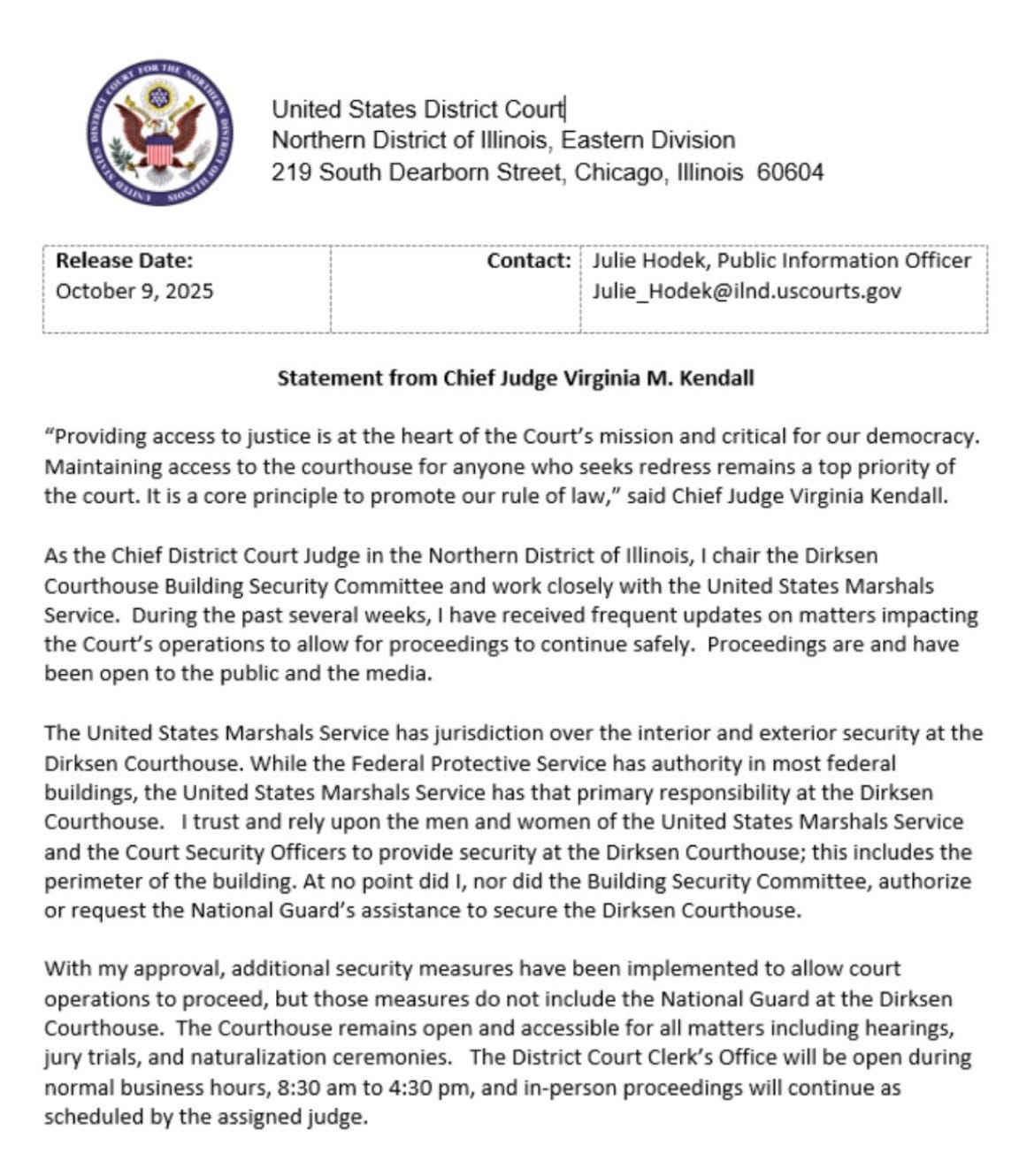Vance: As He Seeks to Normalize Dismantling of Independent Judiciary, Trump Is Following Blueprint of El Salvador Dictator
Firing unfriendly immigration judges was the first step; now, chief White House thug Stephen Miller has given away the end game by speaking the quiet part out loud.
By Joyce Vance /Civil Discourse
When Kilmar Abrego Garcia was first deported to El Salvador and his lawyers went to court, arguing an immigration judge had previously prohibited it, Stephen Miller, White House deputy chief of staff, commented, “He’s a citizen of El Salvador. So it’s very arrogant, even for American media, to suggest that we would even tell El Salvador how to handle their own citizens.”
But Miller seems to lack the same compunction about letting Nayib Bukele, the President of El Salvador, tell President Trump, and in fact, our entire country, how we should run our courts.
In February of this year, Bukele responded to a tweet from Elon Musk, who posted, “The only way to restore rule of the people in America is to impeach judges. No one is above the law, including judges,” referencing what Bukele had done in El Salvador.
Bukele tweeted, “If you don’t impeach the corrupt judges, you CANNOT fix the country. They will form a cartel (a judicial dictatorship) and block all reforms, protecting the systemic corruption that put them in their seats.”
Bukele’s tweet resurfaced earlier this month, when Elon Musk retweeted a right-wing media personality, Eric Daugherty, who suggested, “We need to Bukele our court system.”
Following Bukele’s lead. In 2021, after his party gained control of El Salvador’s Legislative Assembly, Bukele’s allies removed all five Supreme Court judges and the attorney general, replacing them with individuals who were loyal to Bukele within hours. Bukele has called himself the “world’s coolest dictator.”
The Biden Administration was openly critical of some of Bukele’s anti-democratic actions, while Trump had accused Bukele in the past of lowering El Salvador’s crime rate by sending its criminal to the U.S. But the relationship thawed early in Trump’s second term, when he seized on the idea of deporting people who were illegally present in the United States and paying Bukele a reported $6 million to house them in his CECOT terror prison for the first year. But above all the anti-democratic moves Bukele has made, it’s his approach to sweeping the judiciary out of his way if they won’t go along that is most dangerous.
And Trump has appeared to be open to the following Bukele’s lead.
In March, Trump threatened federal judge Jeb Boasberg with impeachment when he didn’t like his ruling in a deportation case. “Many people have called for his impeachment, the impeachment of this judge. I don’t know who the judge is, but he’s radical left,” Trump said on Fox News. “He was Obama-appointed, and he actually said we shouldn’t be able to take criminals, killers, murderers, horrible, the worst people, gang members, gang leaders, that we shouldn’t be allowed to take them out of our country.”
He continued, “Well, that’s a presidential job that’s not for a local judge to be making that determination.” Trump was echoing others in his administration who had encouraged impeachment proceedings against Judge Boasberg.
Bukele came to Trump’s aid, tweeting, “The U.S. is facing a judicial coup.” It was enough for Trump to note, during an April White House visit from Bukele, that he was open to sending American citizens to El Salvadoran prisons, which, of course, would be illegal. Trump also “The U.S. is facing a judicial coup.”
By May, Stephen Miller was openly saying on Fox News “That’s the whole problem. When you have 700 judges—10, 15, 25 communist judges can try to run the entire country, grind the gears of government to a halt, try to undermine and overthrow previous election result. It’s been rightly called the judicial coup.”
With so much happening on so many fronts, it would be easy to lose track of that history. But it’s essential to understanding what’s happening now. It’s not just the threats to impeach federal judges who rule against the administration.
The record to date. Since Trump has returned to office, 139 immigration judges have been fired, taken an early-out offer, or been involuntarily transferred. That’s out of about 600 immigration judges nationwide. They are “Article II” judges, appointed by the president, and not a part of the Article III branch of independent federal judges established by the Constitution.
Trump has taken the view he is free to fire them at will. One of the fired judges has said, “I believe the Trump administration can’t stand people who play by the rules.”
All of this further threatens due process rights in our country.
The administration has mounted an attack on judges everywhere. Whether it was the federal indictment of a state court judge in Wisconsin, accused of interfering with a deportation or the threats against federal judges whose decisions he didn’t like, Trump is determined to have his way when it comes to immigration, and to roll over any judge who gets in his way, damn the constitutional consequences.
Standing up to Trump. Some Judges have other ideas.
In Chicago, the Chief Judge for the Northern District of Illinois, Virginia Kendall, made it clear that her courthouse does not need National Guard troops to protect it, saying, “At no point did I, nor the Building Security Committee, authorize or request the National Guard’s assistance to secure the Dirksen Courthouse.”
Judge Kendall, who was appointed by George W. Bush in 2006, noted that the security of the courthouse is under the jurisdiction of the U.S. Marshals Service and that she “trust[s] and rel[ies] upon the men and women of the United States Marshals Service and the Court Security Officers to provide security at the Dirksen Courthouse.”
That can’t be welcome news for an administration that has to establish it is “unable with the regular forces to execute the laws of the United States” and protect federal property, in order to justify calling up National Guard troops.
It’s just that kind of independent thinking by judges that means, inevitably, the judiciary will battle with the president over the constitutional balance of power that the country is built upon.
That is especially so because Congress has removed itself from the equation as a possible fulcrum upon which democracy could balance. It’s all up to the Article III branch of government, the courts, now. Trump knows this. They know it.
Why lower courts are essential. The Supreme Court has given Trump an enormous amount of help, not least of all by delaying his criminal prosecution over January 6 and granting him expansive presidential immunity. But the lower courts have been far less indulgent. If we look at the way Bukele runs courts, we see why it is essential that they remain so.
“Bukele forced out independent judges, packed the courts with loyalists, then declared a state of emergency that allowed him to arrest and indefinitely detain people without any due process,” tweeted Pod Save America co-host Tommy Vietor. “When we say these guys are advocating for fascist ideas, it’s because they literally are.”
The fact that an American president would even entertain following suit should be terrifying, especially when “fighting crime” is on the verge of becoming an excuse for extending authoritarianism.
Virginia Commonwealth University political science professor Michael Paarlberg weighed in to suggest some “further context,” that, “Bukele subverted the judiciary (also the AG and anti-corruption body) not because he needed to in order to fight crime, but because he needed to get around the constitutional ban on reelection, and shut down corruption investigations against his administration.”
Dangerous nonsense. The idea that we should follow Bukele’s course in his country with our courts is dangerous nonsense.
Politicizing the judiciary, firing and frightening jurists who want to do their jobs, is what every tinpot dictator does as a precursor to seizing control.
Firing immigration judges because you don’t like their decisions is a paradigm shifter.
Like so much else Trump does, it’s part of shifting the Overton Window and getting Americans used to the unthinkable so that he can do it. What should be a nonstarter for Republicans is now becoming part of Trump’s range of reasonable policies. If you don’t like judges, just fire or impeach them.
Why is it important to threaten and intimidate the courts? Because of what is coming.
The role of SCOTUS. We talk a lot about the audience of one. There’s also an audience of nine, or put more rightly, an audience of six, that must be persuaded to continue to side with the president.
As the administration seems to increasingly focus on invoking the Insurrection Act, keeping the Court on its side will be of utmost importance.
Responding to a question about the legality of deploying National Guard soldiers to Portland, Oregon, last week, Stephen Miller began to respond that “the president has plenary authority” to do so. He was cut off, either by a technical glitch or some recognition that he was about to say the quiet part out loud, because plenary authority means unlimited power to act.
That’s what the Trump administration is advocating for: a unitary presidency that no court has the power to second-guess, which effectively means limitless power. That’s a good reason to try to Bukele the courts if you’re the president.
Bukele is not someone any other president would have put on the list for an early visit to the White House. You may recall we discussed him in February, when I wrote that, “Tuesday night [Elon] Musk tweeted about impeaching judges at least six times. ‘The only way to restore rule of the people in America is to impeach judges. No one is above the law, including judges.
That is what it took to fix El Salvador. Same applies to America,’ he wrote at one point. The president of El Salvador, Nayib Bukele retweeted Musk, adding, ‘If you don’t impeach the corrupt judges, you CANNOT fix the country.’”
Bottom line. We don’t need Bukele’s kind of fix for our country. It’s not just that he runs a torture prison; it’s that he doesn’t believe in the rule of law at all. He should never have been housing American deportees or prisoners, and he certainly shouldn’t be whispering in the ear of an American president.
Hands off our democracy. We’re in this together.
Former U.S. Attorney Joyce Vance is a legal analyst for NBC. Subscribe to her “Civil Discourse” newsletter here.
Image: Time.


